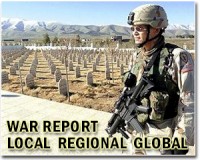 |
Washington (AFP) March 9, 2011 The United States still seems skeptical of a drumbeat of demands for a Libyan no-fly zone, but hints are emerging of a possible last-ditch plan to deter any mass aerial slaughter of civilians. NATO defense ministers are set to meet Thursday in Brussels seeking consensus on intense contingency planning that has included study of no-fly zones, humanitarian missions and other possible military action. Officials did not comment publicly on their strategy heading into the talks, other than to respond to calls for a no-fly zone by saying the option, though complex and problematic, is under active consideration. White House spokesman Jay Carney also said Washington had a "strong preference" that any eventual US military action take place under an umbrella of international endorsement. Privately, however, officials argue that the media-driven debate over a no-fly zone has obscured difficulties implicit in any bid to seize control of Libya's skies amid a crackdown by Moamer Kadhafi. They argue that though an attempt to impose a no-fly zone over Libya with fast fighter jets could ground Libyan planes, it may not deprive Kadhafi of the use of helicopter gunships with which he could launch raids. While NATO or some kind of international force could bomb airfields, fast jets are unsuitable for attacking helicopters, which fly at low levels and can takeoff and land anywhere, sources said. Defense Secretary Robert Gates has also warned that establishing a no-fly zone over Libya would likely entail attacks on air defense systems -- which would likely be seen by Kadhafi as an act of war. Administration critics though, including Republican Senator John McCain, have argued that establishing a no-fly zone would not be as complicated as the White House says. But Washington's ambassador to NATO Ivo Daalder said this week that despite raids on rebels by Kadhafi forces, air attacks have not been a "deciding factor" in Libyan unrest. However, ruling out a no-fly zone completely also appears a politically unpalatable option for Washington and its allies. Indeed, Britain and France are pushing a draft UN Security Council resolution on a no-fly zone, though skeptics say Russia and China may veto any such action. Officials say that other military options, such as jamming Libyan communications and blanket aerial surveillance are also possible. Western leaders appear haunted by memories of massacres of civilians in places like Rwanda and the former Yugoslavia, and a decision to rule out a no-fly zone completely might offer an unwanted boost to Kadhafi's regime. British Prime Minister David Cameron appeared to hint at a possible compromise on Tuesday. "I had a phone call with President Obama this afternoon to talk about the planning we have to do in case this continues and in case (Kadhafi) does terrible things to his own people," Cameron told the BBC's "The One Show." "I don't think we can stand aside and let that happen." US sources said privately that should Kadhafi turn cataclysmic violence on his own people, Washington and its allies would have the military assets in place needed to respond. It is also clear heading into the NATO meeting that Washington is not contemplating military action without broad international support. Obama has been adamant that Washington, with a checkered history in the Middle East following the Iraq war and other misadventures, cannot risk blurring indigenous Arab revolutions against hated rulers by intervening. Kadhafi has already tried to exploit international calls for action against Libya, seeking to score propaganda points by saying "colonialist countries are hatching a plot to humiliate" Libyans and control their oil. Obama also has domestic considerations. With 50,000 troops still in Iraq and around 100,000 in Afghanistan, the US military is stretched. There have already been murmurings on Capitol Hill at the cost of any action in Libya. Previous US military operations and casualties in Beirut in the 1980s and Somalia in the 1990s also pose cautionary tales, as does the heavy US price paid in blood and treasure for its invasion of Iraq. "I would say all of those recent examples, or not so recent examples do play to some caution here," said Matthew Waxman, Council on Foreign Relations senior fellow on law and foreign policy. "To some extent it depends a lot on what kinds of international support any intervention receives," he said, mentioning possible endorsements by the Arab League or the African Union. There is also a realist foreign policy school at work on Libya policy that suggests that though Libya has captured global headlines and jolted oil markets, it is not a vital US foreign policy interest Such arguments further weigh against US unilateral action.
Share This Article With Planet Earth
Related Links
 Egypt 'aids Libyan rebels against Gadhafi'
Egypt 'aids Libyan rebels against Gadhafi'Beirut, Lebanon (UPI) Mar 9, 2011 Egypt, still grappling with a revolution that toppled President Hosni Mubarak in February, is reported to be quietly aiding rebel forces seeking to oust Libyan leader Moammar Gadhafi. This is seen as part of a drive by the transitional regime in Cairo to restore Egypt's leadership of the Arab world. While the United States and the international community debate whether to interve ... read more |
|
| The content herein, unless otherwise known to be public domain, are Copyright 1995-2010 - SpaceDaily. AFP and UPI Wire Stories are copyright Agence France-Presse and United Press International. ESA Portal Reports are copyright European Space Agency. All NASA sourced material is public domain. Additional copyrights may apply in whole or part to other bona fide parties. Advertising does not imply endorsement,agreement or approval of any opinions, statements or information provided by SpaceDaily on any Web page published or hosted by SpaceDaily. Privacy Statement |